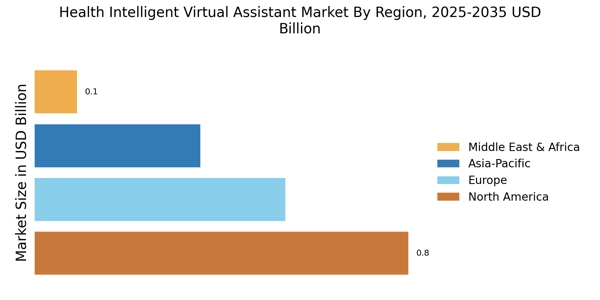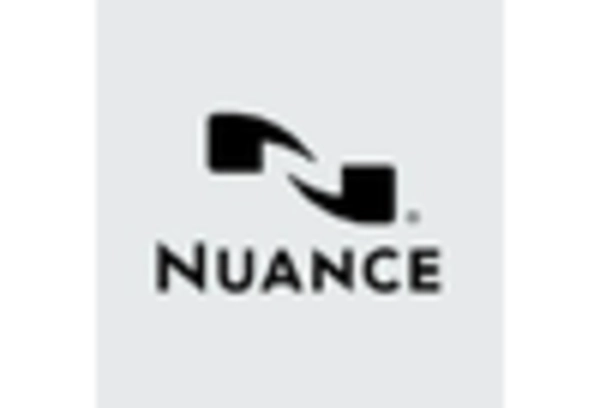Growing Focus on Preventive Healthcare
The Health Intelligent Virtual Assistant Market is witnessing a growing focus on preventive healthcare, which emphasizes the importance of early detection and management of health conditions. This shift in healthcare paradigms encourages individuals to take proactive measures regarding their health, leading to increased utilization of health intelligent virtual assistants. These virtual assistants can provide personalized health tips, reminders for medication, and alerts for routine check-ups, thereby promoting healthier lifestyles. Market analysis indicates that the preventive healthcare market is expanding, with consumers increasingly seeking tools that support their health management. As a result, the Health Intelligent Virtual Assistant Market is likely to benefit from this trend, as more individuals turn to technology for assistance in maintaining their well-being.
Integration with Health Information Systems
The integration of health intelligent virtual assistants with existing health information systems is a pivotal driver for the Health Intelligent Virtual Assistant Market. This integration facilitates seamless communication between patients and healthcare providers, ensuring that vital health data is readily accessible. By connecting virtual assistants to electronic health records and other health management systems, healthcare organizations can enhance the efficiency of care delivery. Market data indicates that the interoperability of health technologies is becoming increasingly prioritized, as it allows for better data sharing and improved patient outcomes. Consequently, the Health Intelligent Virtual Assistant Market stands to gain from this trend, as organizations seek to implement solutions that streamline operations and enhance patient engagement.
Rising Demand for Remote Healthcare Solutions
The Health Intelligent Virtual Assistant Market experiences a notable surge in demand for remote healthcare solutions. This trend is driven by the increasing need for accessible healthcare services, particularly among populations with limited mobility or those residing in remote areas. According to recent data, the telehealth market is projected to reach substantial figures, indicating a shift towards virtual care. Health intelligent virtual assistants play a crucial role in this transformation by providing patients with immediate access to medical information, appointment scheduling, and symptom checking. As healthcare providers seek to enhance patient engagement and satisfaction, the integration of virtual assistants becomes essential. This demand for remote healthcare solutions is likely to continue growing, thereby propelling the Health Intelligent Virtual Assistant Market forward.
Advancements in Artificial Intelligence Technology
The Health Intelligent Virtual Assistant Market is significantly influenced by advancements in artificial intelligence technology. Innovations in natural language processing and machine learning enable virtual assistants to understand and respond to patient inquiries more effectively. These technological improvements enhance the user experience, making interactions with health intelligent virtual assistants more intuitive and efficient. As AI technology continues to evolve, it is anticipated that the capabilities of these virtual assistants will expand, allowing for more personalized healthcare experiences. Market data suggests that the AI healthcare market is on an upward trajectory, which could further stimulate growth in the Health Intelligent Virtual Assistant Market. The potential for AI to revolutionize patient care and streamline healthcare operations cannot be understated.
Increased Investment in Digital Health Technologies
The Health Intelligent Virtual Assistant Market is benefiting from increased investment in digital health technologies. As healthcare organizations recognize the potential of digital solutions to improve patient care and operational efficiency, funding for innovative technologies is on the rise. This influx of investment supports the development and deployment of health intelligent virtual assistants, which can assist in various tasks such as triaging patients, providing health information, and managing chronic conditions. Market trends suggest that the digital health market is expanding rapidly, with significant financial backing from both public and private sectors. This trend is likely to bolster the Health Intelligent Virtual Assistant Market, as more resources become available for the advancement of virtual assistant technologies.

















